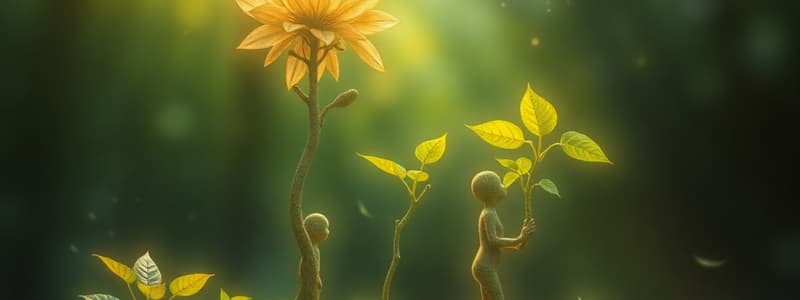Podcast
Questions and Answers
Which of the following best describes 'tropism' in plants?
Which of the following best describes 'tropism' in plants?
- A plant's reaction to a stimulus in the environment. (correct)
- The plant's absorption of water.
- The process of photosynthesis.
- The production of auxins by the plant.
What is the primary function of auxins in plants?
What is the primary function of auxins in plants?
- To control growth and various tropisms. (correct)
- To enable the plant to respond to touch.
- To facilitate the uptake of water.
- To protect the plant from excessive light.
Which tropism describes a plant's response to the pull of gravity?
Which tropism describes a plant's response to the pull of gravity?
- Thigmotropism
- Hydrotropism
- Phototropism
- Geotropism (correct)
A plant growing towards a window exhibits which type of tropism?
A plant growing towards a window exhibits which type of tropism?
What is another term used to describe the toddler stage of human development?
What is another term used to describe the toddler stage of human development?
Which of the following is a key characteristic of the toddler stage?
Which of the following is a key characteristic of the toddler stage?
What is characteristic of the adolescence stage in the human life cycle?
What is characteristic of the adolescence stage in the human life cycle?
According to the information, at what age is a human being considered an adult according to the law?
According to the information, at what age is a human being considered an adult according to the law?
Which of the following best describes the primary function of the endosperm in a seed?
Which of the following best describes the primary function of the endosperm in a seed?
What is a key characteristic of insects that undergo incomplete metamorphosis?
What is a key characteristic of insects that undergo incomplete metamorphosis?
At what specific stage in the process of seed germination does the stem initially emerge from the soil?
At what specific stage in the process of seed germination does the stem initially emerge from the soil?
Which of the following is NOT a critical factor in seed germination?
Which of the following is NOT a critical factor in seed germination?
What is the primary source of nutrition for baby animals immediately after birth?
What is the primary source of nutrition for baby animals immediately after birth?
What is the definition of the term 'life cycle' as used in the context of the provided information?
What is the definition of the term 'life cycle' as used in the context of the provided information?
Which age group is typically associated with the ‘late adulthood’ stage of life?
Which age group is typically associated with the ‘late adulthood’ stage of life?
Which part of the plant is directly developed from the embryo within the seed?
Which part of the plant is directly developed from the embryo within the seed?
What primarily defines an ecosystem?
What primarily defines an ecosystem?
What role do producers play within an ecosystem?
What role do producers play within an ecosystem?
Which group represents organisms that exclusively consume plant matter for energy?
Which group represents organisms that exclusively consume plant matter for energy?
A linear sequence of energy transfer that shows how organisms are related predator to prey is called a:
A linear sequence of energy transfer that shows how organisms are related predator to prey is called a:
How does a food web differ from a food chain?
How does a food web differ from a food chain?
What is the main function of decomposers within an ecosystem?
What is the main function of decomposers within an ecosystem?
Which of the following is considered an abiotic factor in an ecosystem?
Which of the following is considered an abiotic factor in an ecosystem?
How do humans typically participate in a food chain or web?
How do humans typically participate in a food chain or web?
Flashcards
What is a life cycle?
What is a life cycle?
The natural progression of changes an organism undergoes from birth to death.
Toddler Stage
Toddler Stage
The stage after infancy, also known as the preschool years. Physical development slows, but social, emotional, and intellectual changes are rapid.
Tropism
Tropism
A plant's reaction to a stimulus in its environment, causing movement.
Stimulus
Stimulus
Signup and view all the flashcards
Response
Response
Signup and view all the flashcards
Auxins
Auxins
Signup and view all the flashcards
Phototropism
Phototropism
Signup and view all the flashcards
Adolescence or Puberty
Adolescence or Puberty
Signup and view all the flashcards
Adulthood
Adulthood
Signup and view all the flashcards
Late Adulthood
Late Adulthood
Signup and view all the flashcards
Life Cycle
Life Cycle
Signup and view all the flashcards
Infancy
Infancy
Signup and view all the flashcards
Metamorphosis
Metamorphosis
Signup and view all the flashcards
Incomplete Metamorphosis
Incomplete Metamorphosis
Signup and view all the flashcards
Seed
Seed
Signup and view all the flashcards
Seed Germination
Seed Germination
Signup and view all the flashcards
Food Chain
Food Chain
Signup and view all the flashcards
Food Web
Food Web
Signup and view all the flashcards
Producers
Producers
Signup and view all the flashcards
Consumers
Consumers
Signup and view all the flashcards
Herbivores
Herbivores
Signup and view all the flashcards
Carnivores
Carnivores
Signup and view all the flashcards
Omnivores
Omnivores
Signup and view all the flashcards
Decomposers
Decomposers
Signup and view all the flashcards
Study Notes
Plant Responses to Environmental Conditions
- Plants react to stimuli in their environment, a process called tropism.
- A stimulus is anything that causes a change in an organism.
- Plants respond to stimuli through plant movement.
- Auxins are plant hormones responsible for various tropisms.
Plant Tropisms
- Phototropism: Plant response to light.
- Hydrotropism: Plant response to water.
- Geotropism: Plant response to the Earth's gravity.
- Thigmotropism: Plant response to touch.
- Anemotropism: Plant response to air.
- Thermotropism: Plant response to temperature.
- Heliotropism: Plant response to sunlight.
The Life Cycle of Humans
- A life cycle is how living things grow and change throughout their lives.
- It includes reproduction.
Infancy Stage
- Immediately after birth, babies depend on their mother's milk for nourishment.
Toddler Stage
- Toddler years are also called preschool years.
- Physical and motor development begins to slow down, though intellectual, emotional, and social development continues.
- Vocabulary and understanding concepts like time and opposites develop.
Childhood Stage
- This period is characterized by variability in growth rates among children.
- Children typically start school during this stage.
Adolescence/Puberty
- A period of rapid physical and emotional changes, typically occurring between ages 12-15.
- The changes occurring during this stage are typical and normal for both boys and girls.
Adulthood
- The adult stage is considered to begin after age 21.
- During this stage, humans generally have full physical and intellectual capacities.
Late Adulthood
- This begins at around 60 years old and is often associated with decreased physical and mental abilities in some individuals.
Stages in Animal Lifecycles
- Some animals are born alive from the mother.
Parts of a Seed
- Embryo: The part of the seed that will grow into a new plant.
- Endosperm: A food storage part for the developing embryo.
- Seed Coat: The outer protective layer of a seed.
Seed Germination
- Seeds need proper moisture, air, and temperature to germinate.
- The process typically begins with the embryonic root emerging first, followed by the stem.
Ecosystem Components
- An ecosystem includes living (biotic) and non-living (abiotic) things in an area.
- Biotic factors are life forms in an area.
- Abiotic factors are non-living things like sunlight, water, air, minerals, and temperature.
- Producers, consumers, and decomposers are living components.
Producers
- They make their own food through photosynthesis (plants).
Consumers
- They cannot produce food and rely on other organisms (producers or other consumers) for their food.
- Herbivores: Eat plants
- Carnivores: Eat meat
- Omnivores: Eat both plants and animals
Decomposers
- They break down dead organisms, returning nutrients to the ecosystem.
Food Chains and Food Webs
- Food chains are linear sequences showing how energy is transferred through organisms in the ecosystem.
- Food webs are interconnected food chains.
Beneficial and Harmful Interactions
- Symbiosis describes interactions between organisms living closely together.
- Mutualism: Both organisms benefit.
- Commensalism: One benefits, the other is unaffected.
- Competition: Organisms compete for resources.
- Parasitism: One benefits, the other is harmed.
- Predation: Consumers hunt and kill other organisms for food.
- Victims are called prey.
Studying That Suits You
Use AI to generate personalized quizzes and flashcards to suit your learning preferences.
Related Documents
Description
Test your knowledge about plant responses and human development stages in this engaging quiz. Explore topics ranging from tropism in plants to the characteristics of different life stages in humans. Perfect for biology students and enthusiasts!



